The Final Season
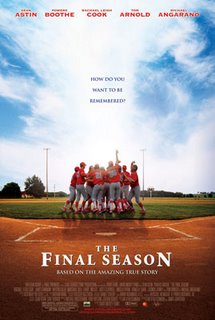 If you're the type of person who doesn't care what movie they're watching, just as long as you're out of the house, then The Final Season is a movie for you. Likewise, if you're the type of person who enjoys hearing the same story told numerous times, with absolutely no alterations or surprises whatsoever, this is also a movie for you. The Final Season is a film that plays so rigidly by the "inspirational spots movie" playbook that I doubt it was so much made, rather it was cobbled together. This coming weekend, there's going to be a parody of these sorts of films called The Comebacks opening in theaters. Watching this movie, I had to ask myself why filmmakers are bothering to parody these movies when, as is proven here, they have become parodies of themselves.
If you're the type of person who doesn't care what movie they're watching, just as long as you're out of the house, then The Final Season is a movie for you. Likewise, if you're the type of person who enjoys hearing the same story told numerous times, with absolutely no alterations or surprises whatsoever, this is also a movie for you. The Final Season is a film that plays so rigidly by the "inspirational spots movie" playbook that I doubt it was so much made, rather it was cobbled together. This coming weekend, there's going to be a parody of these sorts of films called The Comebacks opening in theaters. Watching this movie, I had to ask myself why filmmakers are bothering to parody these movies when, as is proven here, they have become parodies of themselves.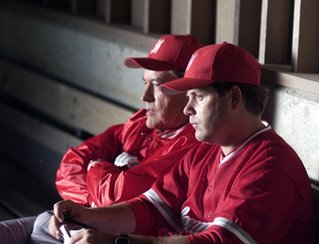 The movie is "based on a true story" of a small farming town in Iowa called Norway, and their love of everything baseball. The movie makes the place looks like it stepped right out of a rerun of The Andy Griffith Show, and includes all the usual small town stock characters we've come to expect, right down to the Barney Fife-like highway patrol officer who just sounds so gosh-darn incredibly friendly when he pulls someone over, I wondered if he was reading the guy his rights, or asking him over to his house for a glass of lemonade. As the story picks up in 1990, the town's high school baseball team, The Tigers, have just won their 19th straight championship game under the wise coaching of Industrial Arts teacher, Jim Van Scoyoc (Powers Boothe). Jim and his team are the pride of everyone in Norway, but just as the celebration starts to kick off, some nasty ol' city folk in their fancy cars and black business suits ride into town. They want to close down the high school, and merge it with a big city school nearby. This means that the Tigers will be disbanded. To the folks of Norway, this is unspeakable. After all, as Jim Van Scoyoc says himself early in the film, this is a town that "grows baseball players the same way we grow corn". Those heartless big city people refuse to listen to their pleas in many town meetings, and even go so far as force Jim to step down as the coach of the team during its final season before the school will close down.
The movie is "based on a true story" of a small farming town in Iowa called Norway, and their love of everything baseball. The movie makes the place looks like it stepped right out of a rerun of The Andy Griffith Show, and includes all the usual small town stock characters we've come to expect, right down to the Barney Fife-like highway patrol officer who just sounds so gosh-darn incredibly friendly when he pulls someone over, I wondered if he was reading the guy his rights, or asking him over to his house for a glass of lemonade. As the story picks up in 1990, the town's high school baseball team, The Tigers, have just won their 19th straight championship game under the wise coaching of Industrial Arts teacher, Jim Van Scoyoc (Powers Boothe). Jim and his team are the pride of everyone in Norway, but just as the celebration starts to kick off, some nasty ol' city folk in their fancy cars and black business suits ride into town. They want to close down the high school, and merge it with a big city school nearby. This means that the Tigers will be disbanded. To the folks of Norway, this is unspeakable. After all, as Jim Van Scoyoc says himself early in the film, this is a town that "grows baseball players the same way we grow corn". Those heartless big city people refuse to listen to their pleas in many town meetings, and even go so far as force Jim to step down as the coach of the team during its final season before the school will close down. But this isn't the end of the treachery put forth by those blasted city folk. And yes, this is a movie where any city with a population over 1,000 is practically considered allied with the Devil. A subplot concerns a troubled teen from Chicago named Mitch (Michael Angarano) moving into town, and he gets ridiculed, beat up, and harassed by everyone until his grandma tells him he should get a hobby, so he goes out for the baseball team, and earns immediate respect. As I was saying, the shifty villains don't want to just fire the coach who has led the Tigers to 19 straight wins, they want the team to lose their final season before they're forced to close down for good. In order to make sure the team is humiliated, they hire who they think is the worst coach they can possibly find. That guy is Kent Stock (Sean Astin). Kent doesn't have a lot of experience coaching baseball, even though he was Jim's assistant coach the previous season. The villains figure that none of the players will accept Kent as the coach, and they won't want to play under him. For a while, the scheme works, and a majority of the regular players don't even show up when practice starts. Kent has some surprises in store for those heartless, city-inhabiting demons, and a majority of the film deals with that burning question of whether or not he can lead the Tigers to their 20th straight victory. I'm sure those of you who have never seen a sports movie before will be surprised by the final outcome.
But this isn't the end of the treachery put forth by those blasted city folk. And yes, this is a movie where any city with a population over 1,000 is practically considered allied with the Devil. A subplot concerns a troubled teen from Chicago named Mitch (Michael Angarano) moving into town, and he gets ridiculed, beat up, and harassed by everyone until his grandma tells him he should get a hobby, so he goes out for the baseball team, and earns immediate respect. As I was saying, the shifty villains don't want to just fire the coach who has led the Tigers to 19 straight wins, they want the team to lose their final season before they're forced to close down for good. In order to make sure the team is humiliated, they hire who they think is the worst coach they can possibly find. That guy is Kent Stock (Sean Astin). Kent doesn't have a lot of experience coaching baseball, even though he was Jim's assistant coach the previous season. The villains figure that none of the players will accept Kent as the coach, and they won't want to play under him. For a while, the scheme works, and a majority of the regular players don't even show up when practice starts. Kent has some surprises in store for those heartless, city-inhabiting demons, and a majority of the film deals with that burning question of whether or not he can lead the Tigers to their 20th straight victory. I'm sure those of you who have never seen a sports movie before will be surprised by the final outcome.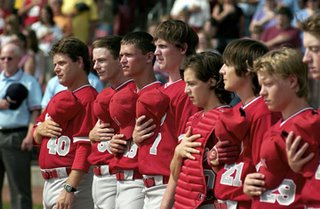 I seem to be complaining about the total lack of anything resembling originality in films these past couple weeks. The Game Plan and We Own the Night were both textbook examples of their respective genres, and now here's The Final Season to further ram the point home that filmmakers just aren't even trying to hide the fact that they're stealing from other films anymore. From the soundtrack, which sounds like a strange hodgepodge of the music scores to two much better movies about baseball - The Natural and Field of Dreams, right down to the direction by David Mickey Evans (who also worked on a much better movie about baseball - 1993's The Sandlot), the movie has not one single second, sequence, character, or performance that we have not seen before. Will the previously mentioned Mitch be able to give up his wicked big city habit of smoking cigarettes? Will Mitch's estranged father (Tom Arnold in a rare dramatic performance, which after seeing it, all but reassures me that he should not attempt drama again) be able to accept his son, give up on that new-fangled cell phone technology, and embrace small town farm life? Will Kent be able to convince the one woman who represents the people who want to close down the school (Rachael Leigh Cook) that her actions are wrong? The movie seems to know that we've seen all of this before, so it wastes very little of our time with them. This leads to numerous half-baked subplots that often have no resolution whatsoever, and are so barely touched upon that we wonder why they're in the screenplay in the first place. Bad boy Mitch starts the movie dressing like he takes fashion tips from Judd Nelson's character in The Breakfast Club, but then he joins the baseball team, falls for the cute blonde that works at the gas station (Danielle Savre), and becomes just as clean cut and likable as everyone else. This miraculous change takes up all of four minutes of screen time.
I seem to be complaining about the total lack of anything resembling originality in films these past couple weeks. The Game Plan and We Own the Night were both textbook examples of their respective genres, and now here's The Final Season to further ram the point home that filmmakers just aren't even trying to hide the fact that they're stealing from other films anymore. From the soundtrack, which sounds like a strange hodgepodge of the music scores to two much better movies about baseball - The Natural and Field of Dreams, right down to the direction by David Mickey Evans (who also worked on a much better movie about baseball - 1993's The Sandlot), the movie has not one single second, sequence, character, or performance that we have not seen before. Will the previously mentioned Mitch be able to give up his wicked big city habit of smoking cigarettes? Will Mitch's estranged father (Tom Arnold in a rare dramatic performance, which after seeing it, all but reassures me that he should not attempt drama again) be able to accept his son, give up on that new-fangled cell phone technology, and embrace small town farm life? Will Kent be able to convince the one woman who represents the people who want to close down the school (Rachael Leigh Cook) that her actions are wrong? The movie seems to know that we've seen all of this before, so it wastes very little of our time with them. This leads to numerous half-baked subplots that often have no resolution whatsoever, and are so barely touched upon that we wonder why they're in the screenplay in the first place. Bad boy Mitch starts the movie dressing like he takes fashion tips from Judd Nelson's character in The Breakfast Club, but then he joins the baseball team, falls for the cute blonde that works at the gas station (Danielle Savre), and becomes just as clean cut and likable as everyone else. This miraculous change takes up all of four minutes of screen time.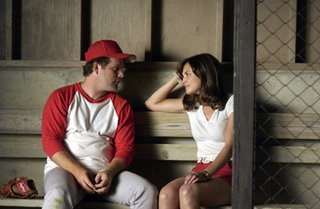 Not even the fate of the Tigers seems to hold much water in this film. As soon as Kent is made the coach of the team, the villains pretty much disappear until the very end, except for the girl who initially supports big city values, until Kent convinces her that small town life is better. She pops up randomly for a date or a game of catch or two, but that's about as deep as their relationship goes. The Tigers' final game season is also similarly glossed over. We get a couple montages, a couple inspirational speeches from Kent, some archival news footage about the actual team that was dug up, and then we get the big championship game scene to wrap it all up. The movie may be by the book, but the book seems to be missing a few pages. We never feel any attachment to anyone who walks into the movie, because the filmmakers seem to care about as much as we do, which is very little. The characters have faces and names, but no distinguishing personalty. They think the same, talk the same, believe in the same thing, and they resent anyone who comes into town whose ideals differ from theirs. Perhaps this movie is intended to glorify small town life, but all it seems to be glorifying is conformity.
Not even the fate of the Tigers seems to hold much water in this film. As soon as Kent is made the coach of the team, the villains pretty much disappear until the very end, except for the girl who initially supports big city values, until Kent convinces her that small town life is better. She pops up randomly for a date or a game of catch or two, but that's about as deep as their relationship goes. The Tigers' final game season is also similarly glossed over. We get a couple montages, a couple inspirational speeches from Kent, some archival news footage about the actual team that was dug up, and then we get the big championship game scene to wrap it all up. The movie may be by the book, but the book seems to be missing a few pages. We never feel any attachment to anyone who walks into the movie, because the filmmakers seem to care about as much as we do, which is very little. The characters have faces and names, but no distinguishing personalty. They think the same, talk the same, believe in the same thing, and they resent anyone who comes into town whose ideals differ from theirs. Perhaps this movie is intended to glorify small town life, but all it seems to be glorifying is conformity.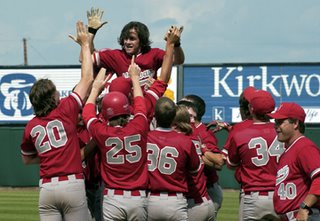 Lead star Sean Astin is certainly no stranger to inspirational sports films, having starred in one of the better ones in recent memory. (1993's Rudy) In The Last Season, which he also executive produced, Astin gives what I like to call a "Boy Wonder performance". He bulges his eyes with child-like innocence, and keeps on saying "gosh" and "wow" over and over. He never creates anything resembling a relationship with his teammates, so his victories during the season seem hollow. Hollow is a good word to describe this entire movie. This is a movie that doesn't know how to make us care, so it just goes through the same tired motions.
Lead star Sean Astin is certainly no stranger to inspirational sports films, having starred in one of the better ones in recent memory. (1993's Rudy) In The Last Season, which he also executive produced, Astin gives what I like to call a "Boy Wonder performance". He bulges his eyes with child-like innocence, and keeps on saying "gosh" and "wow" over and over. He never creates anything resembling a relationship with his teammates, so his victories during the season seem hollow. Hollow is a good word to describe this entire movie. This is a movie that doesn't know how to make us care, so it just goes through the same tired motions. No info found on Amazon - Sorry






1 Comments:
Don't forget it's wildly, and I mean wildly inaccurate. According to the Hollywood Reporter, the first coach left to take a dream job as a pitching coach in the Detroit Tigers farm system.
By Austin Shinn, at 9:22 PM
Austin Shinn, at 9:22 PM
Post a Comment
<< Home